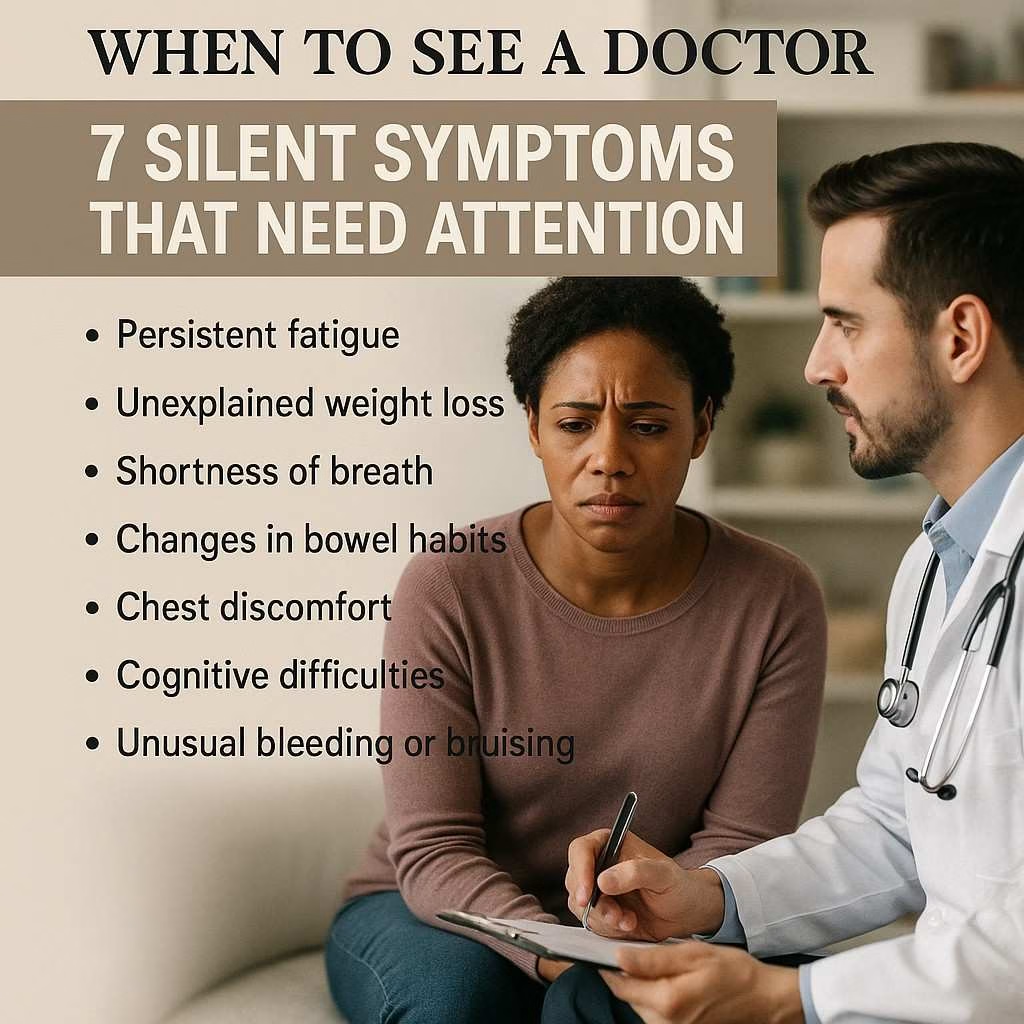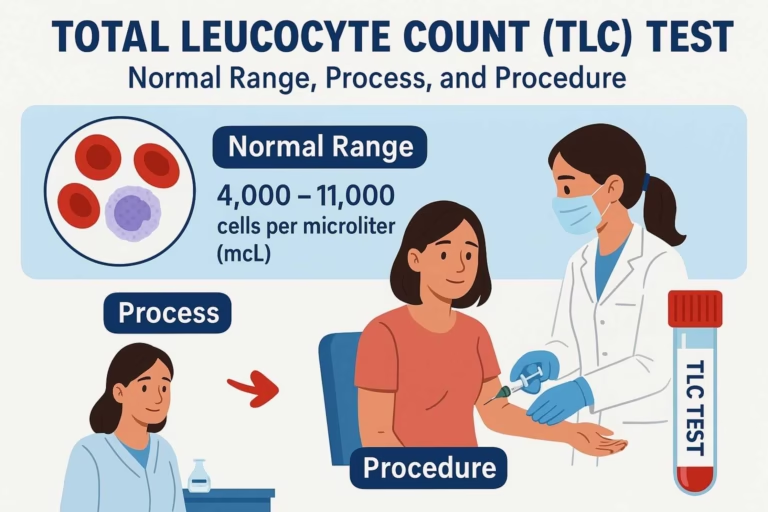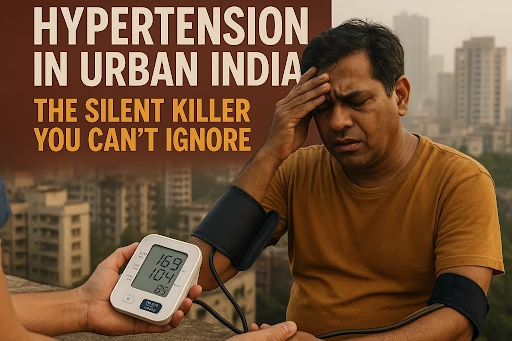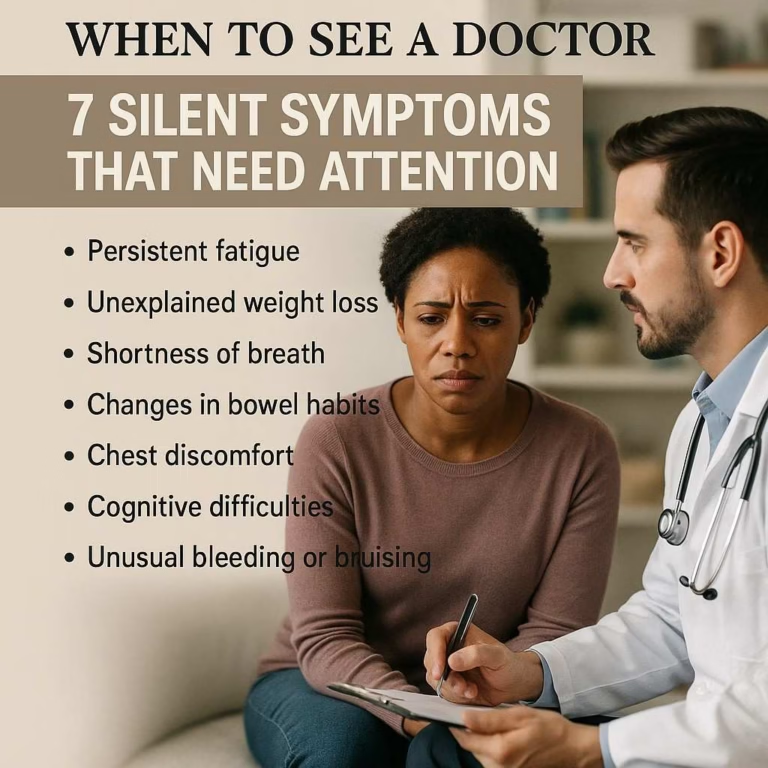
Everyone feels “off” now and then, whether it’s a sore throat, persistent lethargy, or that all-too-familiar discomfort from overdoing it at the gym. Most of the time, these small symptoms go away quickly and are not cause for alarm. But there are moments when your body sends an entirely different message: “Pay attention.” “Something is wrong.” Certain signs can suggest serious, even life-threatening, illnesses. Early detection is key—knowing when to see a doctor can save your life.
Here are 7 silent symptoms that should never be ignored — and why they matter.
1. Unexplained Weight Loss
What it may mean:
- Thyroid imbalance
- Diabetes
- Digestive disorders
- Cancer
When to act:
Losing more than 5% of your body weight in a month without making diet or exercise changes?
Tips- It’s time to see a general practitioner or endocrinologist.
2. Sudden shortness of breath
What it may mean:
- Pulmonary embolism (a blood clot in the lungs)
- Chronic obstructive pulmonary disease (COPD)
- Asthma
- Pneumonia or even acute anxiety
When to act:
Fast or shallow breathing that does not improve with rest.
Frequently worsens when lying down or under exertion.
Tips- No matter the cause, sudden breathing changes warrant immediate evaluation. You should consult a cardiologist without delay.
3. Frequent, Severe Headaches
What it may mean:
- Migraine
- High blood pressure
- Brain tumor or aneurysm
When to act:
A strong “thunderclap” headache that occurs within minutes.
Is the pain strong, sudden, and accompanied by vision problems, nausea, or confusion?
Contact a neurologist right away.
4 . Difficulty in Swallowing or Speaking
What it may mean:
- Stroke
- Throat Cancer
- Neurological disorder
When to act:
If you’re having trouble eating or speaking effectively and the problem persists, consult an ENT specialist or neurologist.
5 . High or Persistent Fever
What it may mean:
- Infections such as pneumonia
- meningitis
- urinary tract infection
Note- In some cases, persistent fever could signal cancers like lymphoma or leukemia. If a fever persists without a known cause, it’s time to call your doctor.
When to Act:
A temperature of 103°F or higher, or a low-grade fever that lasts for more than a week.
If a fever persists without a known cause, it’s time to call your doctor.
6. Swelling of the legs without injury
What it may mean:
- Overweight
- Heart disease
- Vein issues
- Kidney problems
When to act:
If you are experiencing swelling in your legs, seek medical attention, as it could be a symptom of something serious.
7. Irregular or heavy bleeding (women)
What it may mean:
- Hormone imbalance
- Fibroids
- Reproductive health concerns.
When to Act:
Have your periods been irregular, unpleasant, or particularly heavy?
Schedule an appointment with a gynaecologist.
Here Are Some Tips for Staying Safe
- Don’t ignore symptoms that reappear frequently.
- Avoid self-diagnosing over the internet.
- Keep track of any new or unusual physical changes.
- Speak with a specialist rather than waiting it out.
Conclusion
Your body has a built-in warning system, and when it signals concern, it’s essential to listen. Some of these symptoms may be harmless, while others may suggest a serious health problem. When in doubt, do not delay. Seek medical help. It could save your life.
Frequently Asked Questions (FAQs)
How often should I go for a health checkup?
For most adults, an annual checkup is recommended. If you have risk factors like high BP, diabetes, or a family history of illness, you may need more frequent visits.
Is it okay to wait and watch if the symptoms are mild?
Not always. Mild but recurring symptoms (like headaches, fatigue, or digestive issues) could signal early disease stages. Early detection saves lives.
Can stress or lifestyle alone cause these silent symptoms?
Yes. Stress, poor diet, and lack of sleep can contribute to many symptoms — but they can also mask serious conditions. That’s why a medical evaluation is important.
How do I know if a symptom is serious enough to see a doctor?
If a symptom is persistent, worsening, or unusual for your body, it’s always safer to consult a healthcare professional.
References
- American Heart Association. (2023). Symptoms You Shouldn’t Ignore. https://www.heart.org
- Mayo Clinic Staff. (2023). Symptoms and Causes – When to See a Doctor. Mayo Clinic https://www.mayoclinic.org
- National Institutes of Health (NIH). (2022). Warning Signs and Symptoms of Serious Health Conditions. [https://www.nih.gov]
Discover more from The Vigyan Chronicles
Subscribe to get the latest posts sent to your email.



